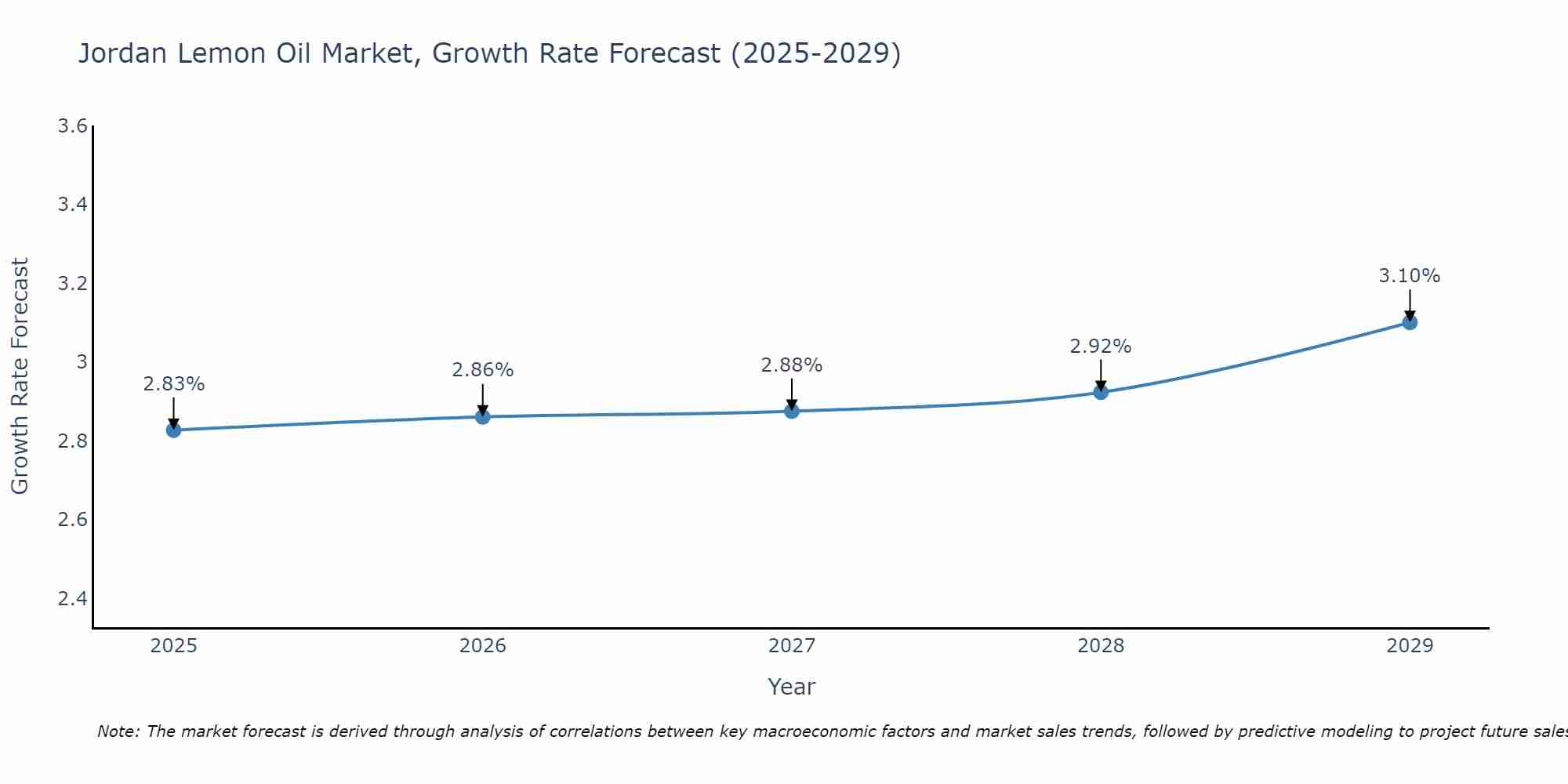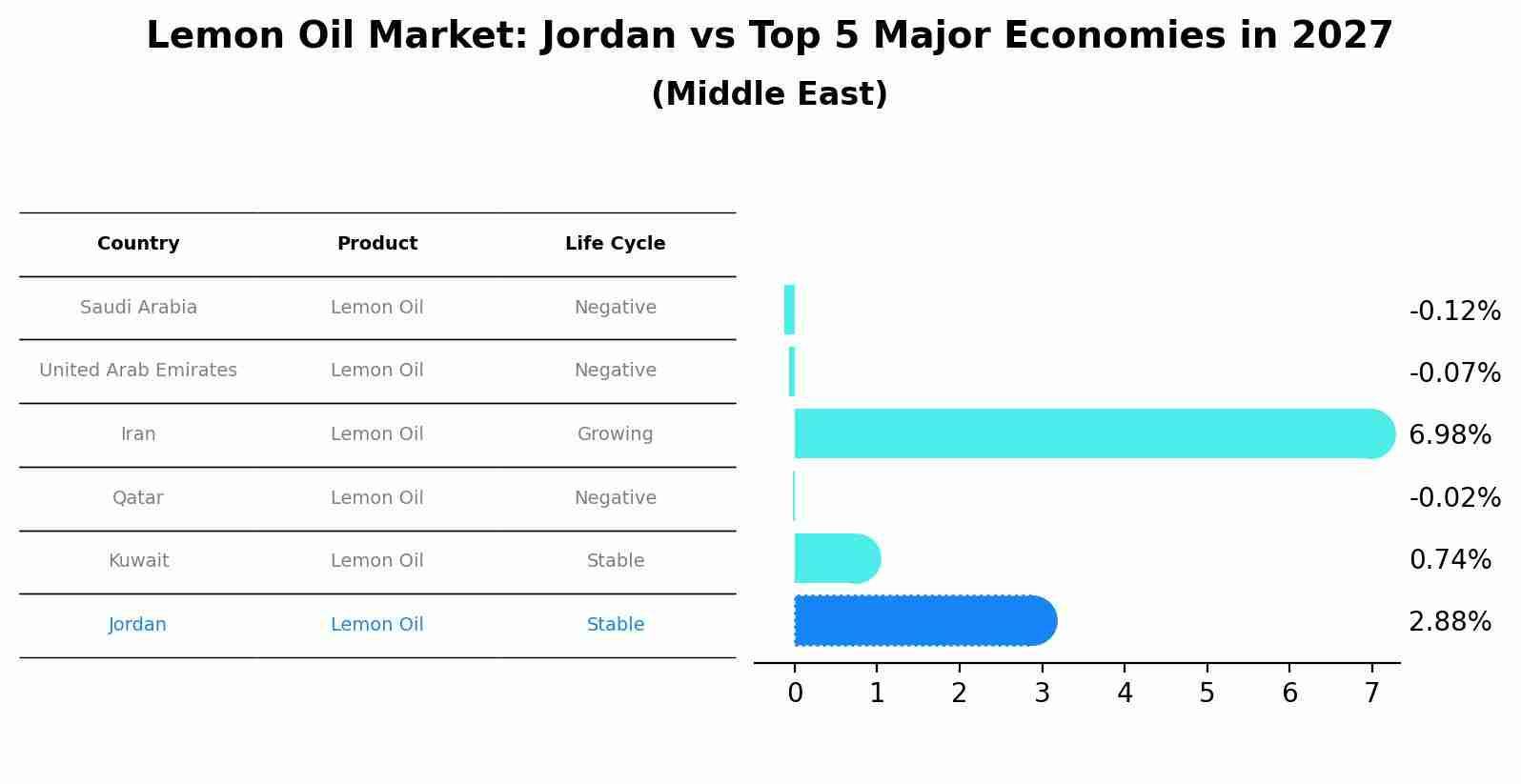Jordan Lemon Oil Market (2025-2031) Outlook | Growth, Forecast, Share, Industry, Revenue, Size, Value, Analysis, Companies & Trends
| Product Code: ETC330826 | Publication Date: Aug 2022 | Updated Date: Aug 2025 | Product Type: Market Research Report | |
| Publisher: 6Wresearch | Author: Shubham Padhi | No. of Pages: 75 | No. of Figures: 35 | No. of Tables: 20 |
Jordan Lemon Oil Market Size Growth Rate
The Jordan Lemon Oil Market is poised for steady growth rate improvements from 2025 to 2029. Commencing at 2.83% in 2025, growth builds up to 3.10% by 2029.

Lemon Oil Market: Jordan vs Top 5 Major Economies in 2027 (Middle East)
The Lemon Oil market in Jordan is projected to grow at a stable growth rate of 2.88% by 2027, within the Middle East region led by Saudi Arabia, along with other countries like United Arab Emirates, Iran, Qatar and Kuwait, collectively shaping a dynamic and evolving market environment driven by innovation and increasing adoption of emerging technologies.

Jordan Lemon Oil Market Overview
Jordan lemon oil market is characterized by steady demand, driven by its extensive use in food and beverage, cosmetics, and aromatherapy industries. Lemon oil, known for its fresh fragrance and therapeutic properties, is valued for its versatility. The market benefits from Jordan favorable climate for citrus cultivation, ensuring a steady supply of raw materials for lemon oil production.
Drivers of the market
The Jordan lemon oil market is primarily driven by the increasing demand for natural and organic products in the personal care and cosmetics industry. The rising awareness of the therapeutic benefits of lemon oil, such as its antibacterial and antiviral properties, fuels market growth. Additionally, the growing use of lemon oil in the food and beverage industry as a flavoring agent contributes to market expansion. The trend towards aromatherapy and natural remedies further supports the market.
Challenges of the market
Despite the potential demand for lemon oil in various industries, the Jordan lemon oil market faces several challenges that impede its growth. One significant challenge is the seasonality of lemon production, which leads to fluctuations in supply and affects the stability of lemon oil prices. Moreover, limited processing and extraction facilities for lemon oil in Jordan constrain the production capacity and quality standards of locally sourced products. Additionally, the lack of standardized grading and quality control measures for lemon oil poses challenges in terms of market transparency and consumer trust. Furthermore, competition from imported lemon oil products with established brands and distribution networks presents a challenge for local producers to penetrate domestic and international markets effectively.
Government Policy of the market
Jordan promotes organic farming and sustainable agricultural practices to support the lemon oil market. Policies include subsidies for farmers and export incentives to enhance competitiveness.
Key Highlights of the Report:
- Jordan Lemon Oil Market Outlook
- Market Size of Jordan Lemon Oil Market, 2024
- Forecast of Jordan Lemon Oil Market, 2031
- Historical Data and Forecast of Jordan Lemon Oil Revenues & Volume for the Period 2021-2031
- Jordan Lemon Oil Market Trend Evolution
- Jordan Lemon Oil Market Drivers and Challenges
- Jordan Lemon Oil Price Trends
- Jordan Lemon Oil Porter's Five Forces
- Jordan Lemon Oil Industry Life Cycle
- Historical Data and Forecast of Jordan Lemon Oil Market Revenues & Volume By End Use for the Period 2021-2031
- Historical Data and Forecast of Jordan Lemon Oil Market Revenues & Volume By Pharmaceutical Industry for the Period 2021-2031
- Historical Data and Forecast of Jordan Lemon Oil Market Revenues & Volume By Food & Beverages for the Period 2021-2031
- Historical Data and Forecast of Jordan Lemon Oil Market Revenues & Volume By Spa & Relaxation for the Period 2021-2031
- Historical Data and Forecast of Jordan Lemon Oil Market Revenues & Volume By Cosmetics & Personal Care Industry for the Period 2021-2031
- Historical Data and Forecast of Jordan Lemon Oil Market Revenues & Volume By Distribution Channel for the Period 2021-2031
- Historical Data and Forecast of Jordan Lemon Oil Market Revenues & Volume By Online for the Period 2021-2031
- Historical Data and Forecast of Jordan Lemon Oil Market Revenues & Volume By Offline for the Period 2021-2031
- Historical Data and Forecast of Jordan Lemon Oil Market Revenues & Volume By Retail Stores for the Period 2021-2031
- Historical Data and Forecast of Jordan Lemon Oil Market Revenues & Volume By Specialty Stores for the Period 2021-2031
- Historical Data and Forecast of Jordan Lemon Oil Market Revenues & Volume By Supermarkets/Hypermarkets for the Period 2021-2031
- Jordan Lemon Oil Import Export Trade Statistics
- Market Opportunity Assessment By End Use
- Market Opportunity Assessment By Distribution Channel
- Jordan Lemon Oil Top Companies Market Share
- Jordan Lemon Oil Competitive Benchmarking By Technical and Operational Parameters
- Jordan Lemon Oil Company Profiles
- Jordan Lemon Oil Key Strategic Recommendations
Frequently Asked Questions About the Market Study (FAQs):
- Single User License$ 1,995
- Department License$ 2,400
- Site License$ 3,120
- Global License$ 3,795
Search
Related Reports
- Australia IT Asset Disposal Market (2025-2031) | Strategy, Consumer Insights, Analysis, Investment Trends, Opportunities, Growth, Size, Share, Industry, Revenue, Segments, Value, Segmentation, Supply, Forecast, Restraints, Outlook, Competition, Drivers, Trends, Demand, Pricing Analysis, Competitive, Strategic Insights, Companies, Challenges
- UAE Building Thermal Insulation Market Outlook (2025-2031) | Revenue, Companies, Share, Trends, Growth, Size, Forecast, Industry, Analysis & Value
- Portugal Electronic Document Management Market (2025-2031) | Strategy, Consumer Insights, Analysis, Investment Trends, Opportunities, Growth, Size, Share, Industry, Revenue, Segments, Value, Segmentation, Supply, Forecast, Restraints, Outlook, Competition, Drivers, Trends, Demand, Pricing Analysis, Competitive, Strategic Insights, Companies, Challenges
- France Electronic Document Management Market (2025-2031) | Strategy, Consumer Insights, Analysis, Investment Trends, Opportunities, Growth, Size, Share, Industry, Revenue, Segments, Value, Segmentation, Supply, Forecast, Restraints, Outlook, Competition, Drivers, Trends, Demand, Pricing Analysis, Competitive, Strategic Insights, Companies, Challenges
- Portugal Occupational Health & Safety Services Market (2025-2031) | Strategy, Consumer Insights, Analysis, Investment Trends, Opportunities, Growth, Size, Share, Industry, Revenue, Segments, Value, Segmentation, Supply, Forecast, Restraints, Outlook, Competition, Drivers, Trends, Demand, Pricing Analysis, Competitive, Strategic Insights, Companies, Challenges
- Netherlands Occupational Health and Safety Services Market (2025-2031) | Strategy, Consumer Insights, Analysis, Investment Trends, Opportunities, Growth, Size, Share, Industry, Revenue, Segments, Value, Segmentation, Supply, Forecast, Restraints, Outlook, Competition, Drivers, Trends, Demand, Pricing Analysis, Competitive, Strategic Insights, Companies, Challenges
- Belgium and Luxembourg Facility Management Market (2025-2031) | Strategy, Consumer Insights, Analysis, Investment Trends, Opportunities, Growth, Size, Share, Industry, Revenue, Segments, Value, Segmentation, Supply, Forecast, Restraints, Outlook, Competition, Drivers, Trends, Demand, Pricing Analysis, Competitive, Strategic Insights, Companies, Challenges
- Russia Women Intimate Apparel Market (2025-2031) | Strategy, Consumer Insights, Analysis, Investment Trends, Opportunities, Growth, Size, Share, Industry, Revenue, Segments, Value, Segmentation, Supply, Forecast, Restraints, Outlook, Competition, Drivers, Trends, Demand, Pricing Analysis, Competitive, Strategic Insights, Companies, Challenges
- Africa Chocolate Market (2025-2031) | Size, Share, Trends, Growth, Revenue, Analysis, Forecast, industry & Outlook
- Global Hydroxychloroquine And Chloroquine Market (2025-2031) | Industry, Trends, Size, Outlook, Growth, Value, Companies, Revenue, Analysis, Share, Forecast
Industry Events and Analyst Meet
Our Clients
Whitepaper
- Middle East & Africa Commercial Security Market Click here to view more.
- Middle East & Africa Fire Safety Systems & Equipment Market Click here to view more.
- GCC Drone Market Click here to view more.
- Middle East Lighting Fixture Market Click here to view more.
- GCC Physical & Perimeter Security Market Click here to view more.
6WResearch In News
- Doha a strategic location for EV manufacturing hub: IPA Qatar
- Demand for luxury TVs surging in the GCC, says Samsung
- Empowering Growth: The Thriving Journey of Bangladesh’s Cable Industry
- Demand for luxury TVs surging in the GCC, says Samsung
- Video call with a traditional healer? Once unthinkable, it’s now common in South Africa
- Intelligent Buildings To Smooth GCC’s Path To Net Zero













